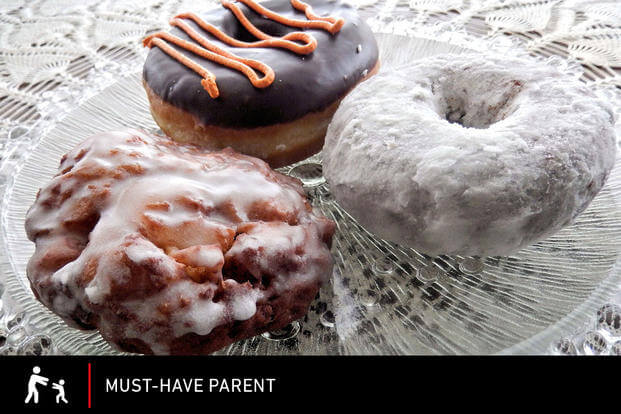When the Must-Do Parent is away, the Must-Have Parent tends to do things a little differently. Some of these changes are out of necessity, some are out of convenience, some are out of preference and some are out of, well, neglect. With repetition, they can all become habits.
I see this most obviously in my life at the dinner table. When my husband is home, we eat together as a family nearly every night, and most of those nights don't happen in restaurants. But when he's deployed, dinner is the first thing to go. The kids and I still eat, of course, but between picky eaters (them) and pure exhaustion (me), I put a lot less effort into meal planning and prep.
When my husband gets home from that deployment, it generally takes me a few days (ahem, weeks) to get back into the real dinners habit.
One of the mottos I live by is "fake it 'til you make it," so that's what I usually do to get out of my bad habits and back into good ones. I muscle through and force myself to just do things the right way until the right way feels right again. But this often comes with some resentment.
(My other life mottos are "why not?" and "if it feels good or makes life easier, it will probably give me cancer." My life mottos are frequently in conflict.)
The other day, as I was cutting the film off one compartment and removing the sprinkles from another before microwaving some Kid Cuisines, I got to wondering: What if there were a better way to break bad habits faster and get back to the good ones, without resentment?
And it turns out that there is.
Judson Brewer is an MD and a PhD. Both of those Ds stand for "doctor," so he's spent a lot of time studying. Breaking bad habits is his specialty, and he gave a fascinating TED Talk about it last fall.
He says the key to breaking bad habits is to notice the urge, get curious about the urge, feel the joy of letting go and repeat.
Here's what that means:
Let's say we've identified a bad habit that we know we need to break. Hypothetically speaking, let's say this bad habit is that the MHP likes to stay up really late drinking cabernet and binging Netflix while the MDP is deployed.
But the MDP is coming home soon and he has to get up really early, like Army-early, for work. The MHP knows her (hypothetical) habit is going to cause conflict when he gets back, but she just can't seem to stop.
In the Netflix-and-cabernet hypothetical, what likely happened is that during a previous deployment (or, I dunno, five) our brave MHP finally got all her whiny children to bed. She'd spent the whole day surrounded by the demanding little people and craved some child-free time for herself. But she was too exhausted to do anything but collapse on the couch and too stressed to fall asleep.
So she added a glass of wine and a found a binge-worthy show. It felt good, so she did it again the next day. (She didn't want to waste that opened bottle of wine.) And the next. Pretty soon, a habit had formed.
Brewer would likely tell her not to try to break this habit with simple discipline. He would tell her not to try to "fake it 'til she makes it." Instead, he would tell her to pour herself a glass of wine and settle into the couch for the new season of Grace and Frankie.
(He's a very good doctor.)
But he would tell her to be mindful while she's doing it. He would tell her to really think about what that wine tastes like. She buys the cheap stuff, so it's probably not good. He would tell her to recognize how her body feels as she's on the couch, getting more and more exhausted but fighting sleep. He would tell her to be curious about why she is doing what she's doing.
In that TED Talk, Brewer said that he worked with a patient in a clinical trial who wanted to quit smoking. He told her to smoke, but to really zone into the experience while she did it. She came back to him saying, "Smoking smells like stinky teas and tastes like chemicals." Once she had analyzed the entire experience, the spell was broken and she became disenchanted with her smoking.
"What do we get from those habits?" Brewer asks in that talk. "Once we understand that, we don't have to force ourselves to fight our behaviors, we can naturally let go. Mindfulness is just about being really interested in finding out what's going on in our bodies and minds. Curiosity is naturally rewarding."
Keep Up with the Ins and Outs of Military Life
For the latest military news and tips on military family benefits and more, subscribe to Military.com and have the information you need delivered directly to your inbox.





















